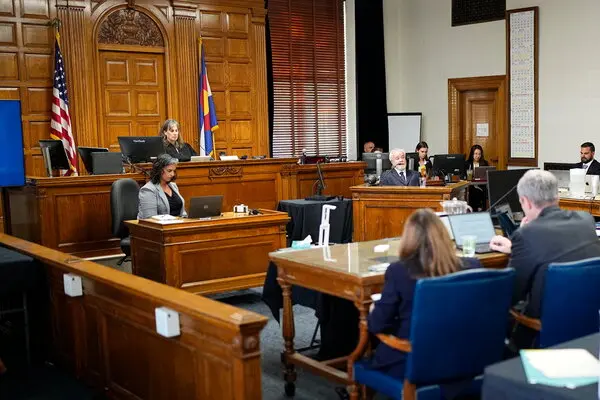In a consequential ruling, a Colorado judge has declared that former President Donald Trump was actively involved in an insurrection on January 6, 2021. However, despite this damning assessment, the judge, Sarah Wallace, has dismissed an attempt to remove him from Colorado’s 2024 primary ballot. The crux of her decision lies in the interpretation of the 14th Amendment’s “insurrectionist ban,” with the judge asserting that this ban does not extend to presidents.
This significant development follows similar legal challenges in Minnesota and Michigan, where attempts to exclude Trump from Republican primary ballots faced rejection. Despite the backing of well-funded advocacy groups, these challenges have not succeeded in keeping Trump off any primary ballot as the 2024 primary season looms closer.
The 102-page ruling by Judge Wallace in Colorado delivers a scathing critique of Trump’s actions, branding him as an insurrectionist who actively fueled the anger of his extremist supporters. The judgment contends that Trump’s intent was to incite political violence directed at the Capitol during his speech at the Ellipse on January 6, 2021.
Wallace explicitly states that Trump engaged in an insurrection through incitement, and she emphasizes that the First Amendment does not shield Trump’s speech in this context. Furthermore, she concludes that Trump acted with the specific intent to disrupt the Electoral College certification of President Biden’s electoral victory through unlawful means.
The legal backdrop involves the 14th Amendment, which, ratified after the Civil War, stipulates that officials who take an oath to support the Constitution are barred from future office if they engaged in insurrection. Notably, this provision explicitly bans insurrectionists from various offices but does not specifically mention the presidency. Wallace interprets the language to exclude the President of the United States, emphasizing that the drafters did not intend to include a person who had only taken the Presidential Oath.
Legal scholars anticipate that these cases will likely reach the U.S. Supreme Court. However, before that, the GOP and independent voters who initiated the Colorado lawsuit may file an appeal to the Colorado Supreme Court.
Despite the strong language in the ruling condemning Trump’s conduct, the practical outcome is that he remains eligible for the 2024 primary ballot in Colorado. Trump’s legal team has dismissed these lawsuits as meritless attempts to deploy an “absurd conspiracy theory” to block his candidacy, especially considering his substantial lead in GOP primary polls and favorable head-to-head polls against President Joe Biden.
While Citizens for Responsibility and Ethics in Washington, the group involved in the Colorado case, fell short in their attempt, they succeeded last year in enforcing the “insurrectionist ban” to remove a convicted January 6 rioter from a New Mexico county commission. The group plans to file an appeal to the Colorado Supreme Court and underscores the historic nature of the case, expressing confidence in the righteousness of their cause.
Trump, currently facing state and federal criminal charges related to his efforts to overturn the 2020 election, has pleaded not guilty. Colorado Secretary of State Jena Griswold emphasizes the importance of allowing the judicial system to decide contentious issues and highlights Trump’s potential danger to American democracy, irrespective of his ballot inclusion.
Trump’s lawyer, Scott Gessler, disagrees with the insurrection label but acknowledges the judge’s decision to keep him on the Colorado ballot. Gessler applauds the judge for respecting democratic processes while expressing dissatisfaction with the negative characterization of Trump in the ruling.
This Colorado case revolves around Trump’s role in stoking political unrest, his call for supporters to converge on Washington, DC, for a “wild” protest on January 6, and his subsequent encouragement for them to march to the Capitol and “fight like hell” to stop Congress from certifying Biden’s victory. The challengers argue that these actions constitute engaging in insurrection against the U.S. Constitution, triggering the potential disqualification outlined in the 14th Amendment.
The trial featured firsthand accounts from Capitol Police officers, video clips of Trump’s speech, and expert testimony on right-wing extremism interpreting Trump’s words as a call to violence. Trump’s defense emphasized efforts to avoid violence and claimed that his speech was protected by the First Amendment.
As this legal saga continues, the anticipation grows over potential appeals and the eventual resolution of these high-stakes challenges, which could shape the interpretation of the 14th Amendment and its application to presidential eligibility.





